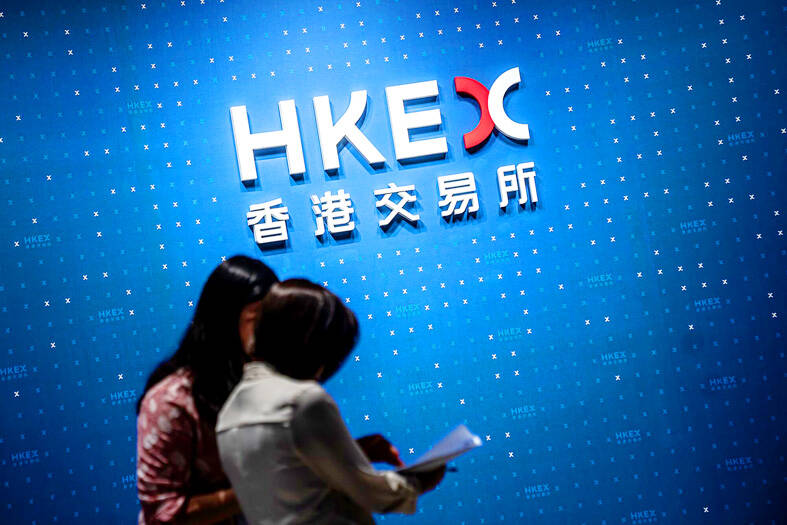A slew of companies have announced plans to list shares in Hong Kong over the next month in a further sign the territory’s initial public offering (IPO) market is reviving.
At least six firms have said they intend to hold IPOs in Hong Kong by late this month, raising a combined HK$3.3 billion (US$424.94 million), based on exchange filings yesterday. They include Chinese toy maker Bloks Group Ltd (布魯可集團) and autonomous vehicle tester Beijing Saimo Technology Co (北京賽目科技).
The rush of filings comes as the Hong Kong board has been taking steps to relax IPO requirements for mainland-listed companies to sell shares in the territory. Chinese securities regulator has also been encouraging the nation’s firms to list in Hong Kong, unveiling a package of measures to bolster the territory’s position as an international financial hub.

Photo: Bloomberg
Investors say the timing of the surge is not unusual given financial statements are only valid for six months, meaning listing announcements tend to peak in June and December.
There is an extra incentive this year too, as many firms might want to complete their listings before US president-elect Donald Trump is inaugurated on Jan. 20.
“From an investor’s viewpoint, I would say it’s a wise decision to get IPO before Trump administration because who knows what he is going to say with his tariff implementation or policy,” said Ronald Chan (陳惠仁), chief investment officer at Chartwell Capital Ltd (大正資本) in Hong Kong. “That could shake up the economy for China and could create unnecessary volatility and that could also be valuation-destructive.”
Hong Kong’s IPO proceeds nearly doubled last year to about US$10 billion, but that is still below the annual average of about US$30 billion for the 10 years preceding the COVID-19 pandemic, data compiled by Bloomberg showed.
Among other companies filing IPO plans yesterday were Anhui Conch Material Technology Co (安徽海螺材料), a subsidiary of Chinese cement giant Anhui Conch Group (安徽海螺集團); ContiOcean Environment Tech Group Co (匯舸環保科技), a provider of maritime environmental protection solutions mainly to shipowners; and recreational vehicle manufacturer New Gonow Recreational Vehicles Inc (新吉奧房車).
The benchmark Hang Seng Index gained almost 18 percent this year, helped by a blitz of stimulus measures announced by China from September. The Hang Seng China Enterprises Index, a gauge of Chinese stocks listed in Hong Kong, climbed 27 percent, its best year since 2009.
“Sentiment is good now — you can be listed with higher valuations, and stock performance will be better,” KGI Asia Ltd (凱基亞洲) head of investment strategy Kenny Wen (溫傑) said. “It’s a good motivation to hold an IPO.”

With an approval rating of just two percent, Peruvian President Dina Boluarte might be the world’s most unpopular leader, according to pollsters. Protests greeted her rise to power 29 months ago, and have marked her entire term — joined by assorted scandals, investigations, controversies and a surge in gang violence. The 63-year-old is the target of a dozen probes, including for her alleged failure to declare gifts of luxury jewels and watches, a scandal inevitably dubbed “Rolexgate.” She is also under the microscope for a two-week undeclared absence for nose surgery — which she insists was medical, not cosmetic — and is

GROWING CONCERN: Some senior Trump administration officials opposed the UAE expansion over fears that another TSMC project could jeopardize its US investment Taiwan Semiconductor Manufacturing Co (TSMC, 台積電) is evaluating building an advanced production facility in the United Arab Emirates (UAE) and has discussed the possibility with officials in US President Donald Trump’s administration, people familiar with the matter said, in a potentially major bet on the Middle East that would only come to fruition with Washington’s approval. The company has had multiple meetings in the past few months with US Special Envoy to the Middle East Steve Witkoff and officials from MGX, an influential investment vehicle overseen by the UAE president’s brother, the people said. The conversations are a continuation of talks that

CAUTIOUS RECOVERY: While the manufacturing sector returned to growth amid the US-China trade truce, firms remain wary as uncertainty clouds the outlook, the CIER said The local manufacturing sector returned to expansion last month, as the official purchasing managers’ index (PMI) rose 2.1 points to 51.0, driven by a temporary easing in US-China trade tensions, the Chung-Hua Institution for Economic Research (CIER, 中華經濟研究院) said yesterday. The PMI gauges the health of the manufacturing industry, with readings above 50 indicating expansion and those below 50 signaling contraction. “Firms are not as pessimistic as they were in April, but they remain far from optimistic,” CIER president Lien Hsien-ming (連賢明) said at a news conference. The full impact of US tariff decisions is unlikely to become clear until later this month

Nintendo Co hopes to match the runaway success of the Switch when its leveled-up new console hits shelves on Thursday, with strong early sales expected despite the gadget’s high price. Featuring a bigger screen and more processing power, the Switch 2 is an upgrade to its predecessor, which has sold 152 million units since launching in 2017 — making it the third-best-selling video game console of all time. However, despite buzz among fans and robust demand for pre-orders, headwinds for Nintendo include uncertainty over US trade tariffs and whether enough people are willing to shell out. The Switch 2 “is priced relatively high”